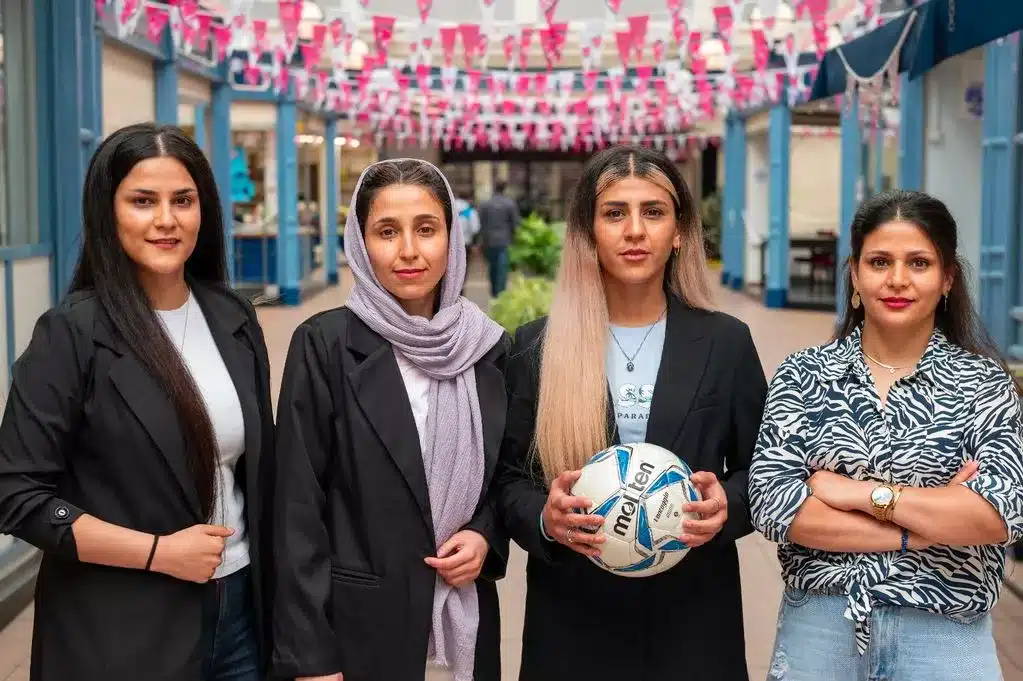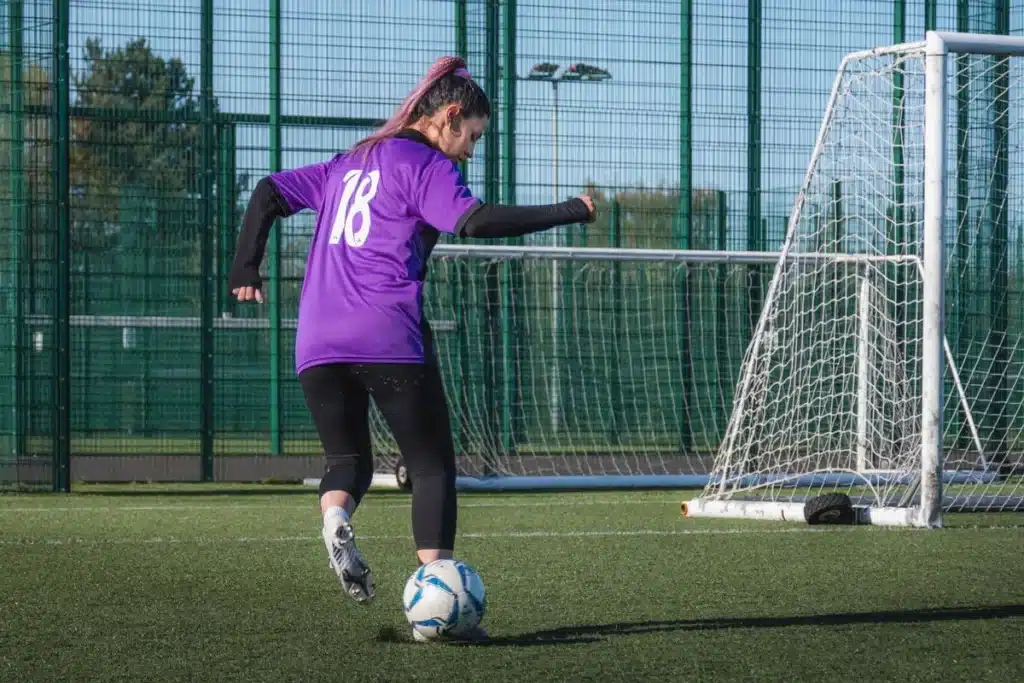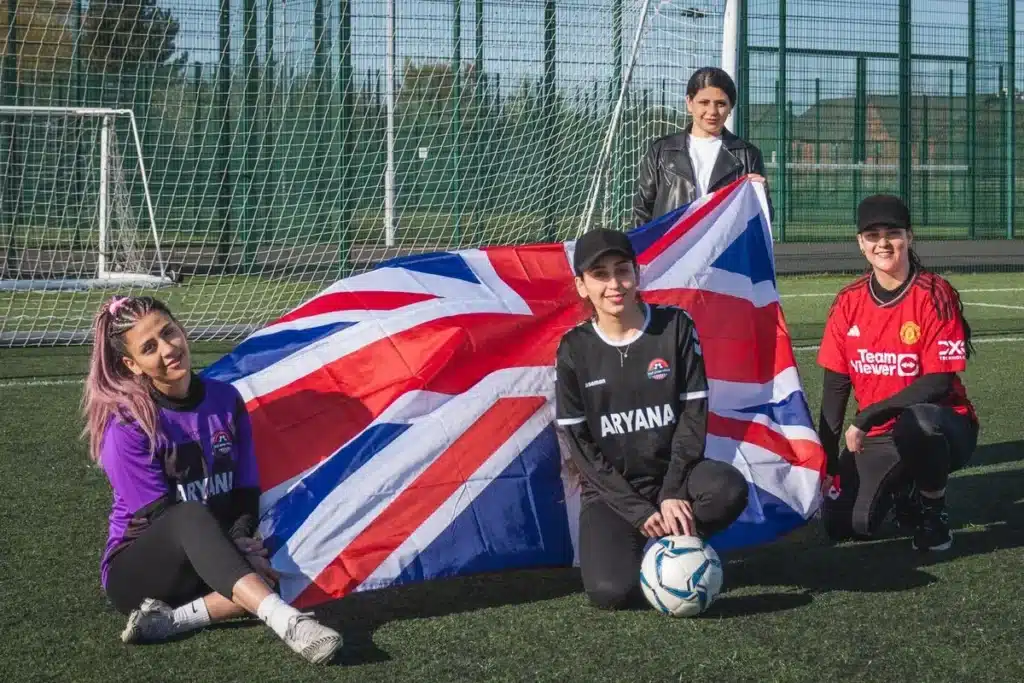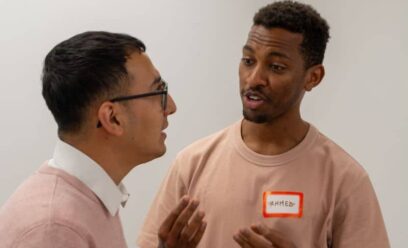Four sisters, one dream: football, resilience, and the power of representation
Posted by Elahe Ziai on September 10, 2025A little boy stood among his classmates, shoulders back and eyes gleaming with pride. He nudged them one by one, leaning in to whisper as if he held the most important secret in the world:
“Hey, did you know they’re from my country? They speak Farsi — just like me!”
It was a moment that melted my heart. That quiet joy, the sudden surge of identity, pride, and belonging — all awakened by a simple recognition. The little boy had likely never even been to his home country, and yet, in that moment, he was home.
I couldn’t help myself — I shared what I’d witnessed with the sisters. They smiled, embraced him, spoke to him in Farsi, and took photos together. His little brown eyes sparkled with pride in those few minutes.
This all took place during a visit to a primary school in Newcastle, where the Ghafouri sisters had come to share their stories with the pupils — stories of resilience, football, family, and hope. The room had been full of young, curious minds, but this one little boy’s reaction captured something deeper: what representation feels like.

Meeting the Ghafouri Sisters
I met the Ghafouri sisters; Rozma, Roma, Mozghan and Resalat three years ago in Carlisle while delivering a media training session to a group of college students who had experienced displacement. As we began, I asked our usual opening question about prior media experiences — positive or negative — from either their country of origin or the UK.
What followed took my breath away. The more the sisters shared, the more I realised they were ‘gold dust’. They weren’t just four strong, determined young Afghan women — they were football players, coaches, survivors, and change makers.
Their story was layered with resilience. After fleeing Afghanistan as children, they grew up in Iran. Knowing what it’s like to grow up in a patriarchal society — especially one where girls playing football in the street was met with hostility — I understood how extraordinary their achievements were.

Ambassadors with a condition
When we began searching for Refugee Week Ambassadors the following year, they immediately came to mind. It took a while to track them down, but when I did, they graciously accepted — with one condition:
“All four of us, or none.”
Despite the financial constraints, IMIX found a way. And thank goodness we did.
The sisters brought energy, warmth, and kindness that uplifted everyone around them. I immediately bonded with them through our shared language and stories. In every conversation, I learned more about their incredible journey — their mother, a lioness in every sense, who championed their dreams; and their father, a devout and traditional man who did not approve of his daughters playing football.
But the girls’ love for the football was unwavering. With quiet courage and clever determination, they found ways to sneak out, organise matches in secret, and practice in alleyways — often under the cover of dusk. Football wasn’t just a pastime for them; it was a form of resistance, of identity, of hope and love.
They even contacted the UN to start a refugee football team after being barred from joining the Iranian national team — and they succeeded. All this while pursuing university education and helping to support their family financially.
Their story wasn’t just powerful — it was cinematic.

The power of shared pain
Soon, The Mirror took an interest. Ros Wynne-Jones, an experienced journalist and a long-time supporter of refugee stories, joined me in Carlisle to cover the sisters’ journey. She brought along a renowned war photographer — Phil Coburn who had lost a leg in a bombing in Afghanistan.
I was there to help interpret. But what unfolded didn’t need language. The connection between him and the sisters was instant. Two sides of the same story, joined by a shared pain and common enemy. It was beautiful and raw.
During that interview, the sisters shared many dreams — one of which was to visit the Manchester City stadium and watch a match in person. Not long after the article was published, that dream came true.
A dream realised
We were invited to a match — not just any match, but one at the iconic Etihad Stadium. It was everything the sisters had dreamed of and more. Watching them beam as they walked through those gates — wide-eyed, thrilled, like little girls — I truly understood what it means when someone says, dreams come true.
We cheered for the Manchester City Women’s team alongside other families and their kids bundled up against the cold, packed into the stands on a January evening. The atmosphere was electric, full of unity and hope. I couldn’t help but think of the countless girls in Iran and elsewhere who are denied even the most basic right to play, to cheer, to belong in a space like this or even to go to the stadiums.
Later that evening, we gathered at a small Afghan restaurant tucked away in Manchester. Over fragrant, nostalgic dishes from their home, we spoke about what lay ahead — healing, aspirations, and the quiet strength it takes to keep dreaming.
Sisters with a bright future
Today, the Ghafouri sisters are still part of our network, IMIX’s family. Recently, I was thrilled to hear that Mozhgan finally received ACL surgery on her knee through the NHS.
These four lionesses are among the brightest highlights of my work — a reminder of why I do what I do. But they’re not alone. My role has gifted me with encounters with so many extraordinary people — refugees, storytellers, survivors — whose voices deserve to be amplified.
This isn’t just a job. It’s a privilege.
And that little boy with the proud secret? He reminded me that representation matters. That seeing someone who looks like you, speaks your language, shares your story — can light a fire that burns long into the future.



